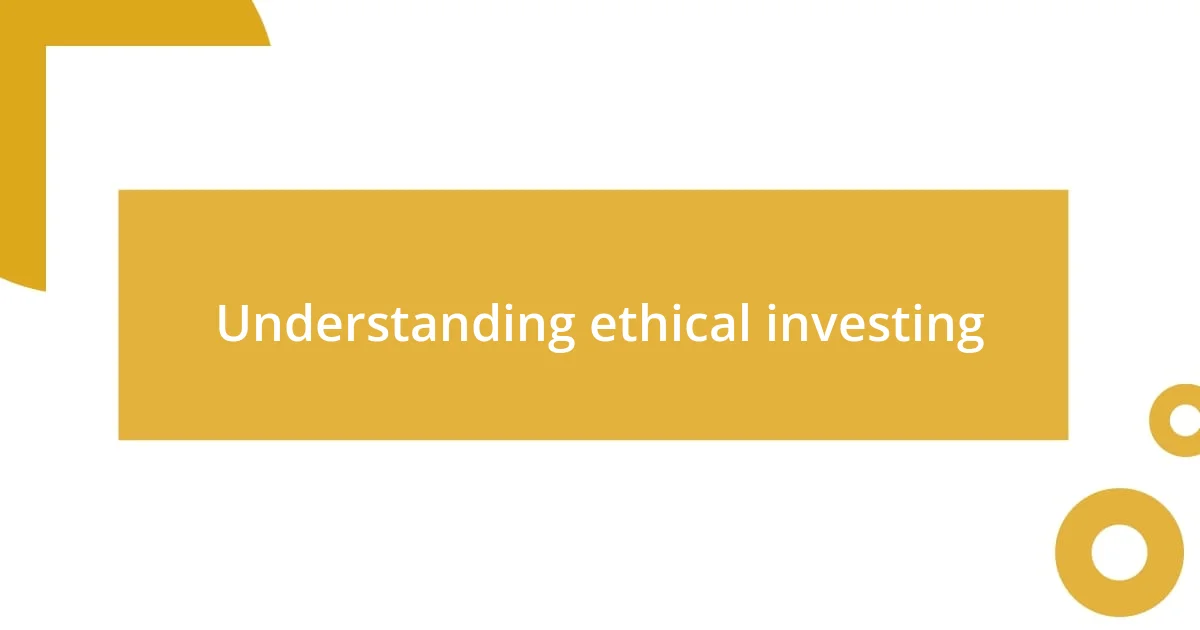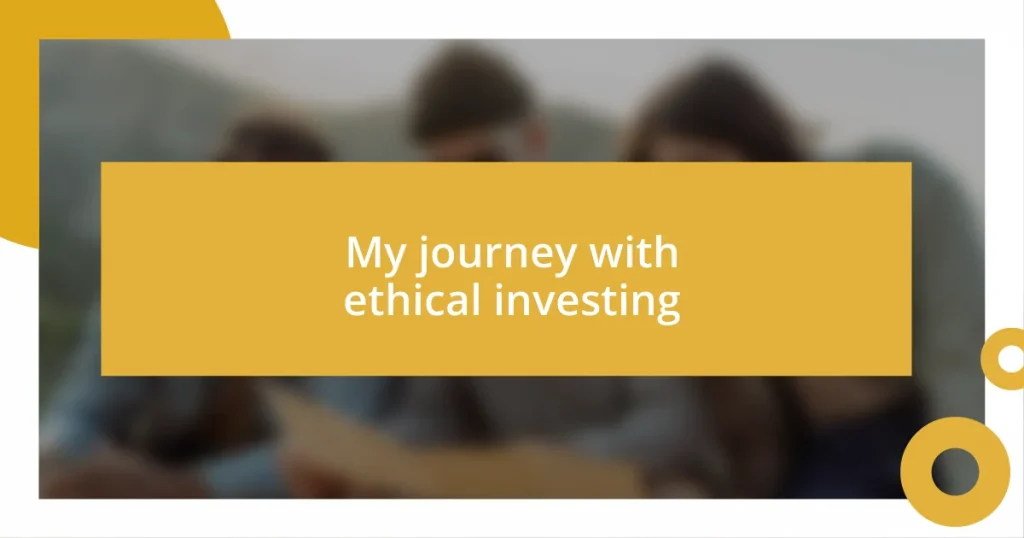Key takeaways:
- Ethical investing aligns personal values with financial decisions, enabling individuals to support businesses that positively impact society.
- It’s crucial to research and evaluate ethical investments based on company practices, impact measurement, community engagement, and diversity.
- Sharing personal investment stories fosters meaningful discussions, inspiring others to consider ethical investment options for their own financial choices.

Understanding ethical investing
Ethical investing is all about aligning your personal values with your financial decisions. I remember the first time I seriously considered where my money was going; it hit me that I could support businesses that were actively making a positive impact on society. Isn’t it empowering to think your investments can reflect what you stand for and contribute to something greater?
When I delved into ethical investing, I discovered terms like ESG (Environmental, Social, and Governance) criteria. It was enlightening to learn how these factors can help assess the sustainability and societal impact of an investment. Have you ever looked into a company’s practices and felt torn between its profitability and its ethics? I’ve been there, and understanding ESG helped me make choices that align with my heart and mind.
Moreover, ethical investing isn’t just about avoiding harmful industries; it’s also about proactively supporting solutions for today’s pressing issues. For instance, when I invested in renewable energy companies, I felt a sense of pride knowing I was part of the transition to a more sustainable future. It raises an important question: wouldn’t you want your money to work for both your financial goals and a better world?

Reasons for choosing ethical investing
Ethical investing often serves as a pathway to make a difference while building wealth. For me, the realization that my portfolio could potentially support businesses that champion human rights felt like turning the lights on in a dark room. I vividly remember that moment of clarity when I chose to divest from a company with questionable labor practices. It felt enriching, knowing my financial decisions could foster positive change instead of contributing to harm.
Additionally, there’s the thrill of engaging with companies that prioritize sustainability. I recall attending a conference about green technology, where I discovered startups revolutionizing the energy sector. The enthusiasm I felt when I invested in one of those companies was unparalleled. It was more than a financial decision; it was joining a movement towards responsible innovation, making me feel like a part of something meaningful and impactful.
Of course, financial performance is crucial, but many ethical investments have proven to be robust over time. When I compared my returns to traditional investments, I felt a sense of validation. Not only was I supporting ethical practices, but I was also securing my financial future. This dual benefit reinforces my choice every day: why not have a portfolio that reflects both my values and financial ambitions?
| Reasons for Choosing Ethical Investing | Traditional Investing |
|---|---|
| Aligns with personal values | Focuses primarily on financial returns |
| Supports sustainable and responsible businesses | May support companies with negative externalities |
| Potential for long-term financial growth | Can yield higher short-term profits |

Researching ethical investment options
Researching ethical investment options can initially feel daunting, but I’ve found it to be an enlightening experience. The first step for me was diving into platforms like social impact reports and sustainability indices. Discovering tools like the MSCI ESG Ratings was a game-changer. I could see how companies measured up against various sustainability criteria, which gave me confidence in my investment choices.
When evaluating different ethical investments, I focus on a few key factors:
- Company practices: I look for transparent policies on labor rights and environmental impact.
- Impact measurement: It’s vital to understand how a company quantifies its positive contributions.
- Community engagement: Businesses that actively support their local communities resonate with me.
- Diversity and inclusion: I prefer investing in companies that prioritize diverse leadership and equitable practices.
I’ve also turned to online forums and social media groups dedicated to ethical investing. It’s refreshing to connect with like-minded individuals eager to support businesses that prioritize positive change. I often find inspiration in shared success stories; they serve as real-life reminders that we all can make a difference, one investment at a time.

Building an ethical investment portfolio
Building an ethical investment portfolio requires thoughtful consideration of various elements. For me, it began with defining what ‘ethical’ really meant to my values. I remember sitting down one evening, reflecting on the issues I cared about most—climate change, social justice, and sustainable development—and how I wanted my financial choices to align with those beliefs. By listing these priorities, I was able to narrow my focus and identify companies that truly embodied those values.
As I ventured further into my investment journey, I discovered the importance of diversification within ethical portfolios. Initially, my tendency was to invest in one or two companies that caught my eye. However, I learned that spreading investments across different sectors not only mitigates risk but also amplifies the potential for impact. I found solace in knowing I could support a renewable energy firm alongside a company championing fair trade practices. This approach made my portfolio feel like a vibrant tapestry of enterprises making a difference.
Furthermore, it’s crucial to continuously review and recalibrate your portfolio. I implemented a practice of revisiting my investments at least twice a year. This habit not only keeps me informed about the companies’ developments but also aligns with my evolving values. Asking myself questions like, “Is this company still living up to its promises?” or “Am I still proud to support their mission?” helps me maintain a portfolio that reflects my commitment to ethical investing. It’s a dynamic journey, and those moments of reflection are pivotal in ensuring my investments not only make financial sense but also resonate with my personal mission.

Evaluating the impact of investments
Evaluating the impact of investments is where the rubber meets the road for me. Each time I dig into a company’s impact metrics, I get a blend of curiosity and responsibility. Like the time I researched a tech company pioneering renewable energy—seeing how they calculated their emissions reduction was both enlightening and inspiring. I often think, “How does this align with my investment goals?” The answers can be eye-opening, revealing whether an investment will genuinely contribute to a better world or just check a box for marketing.
I’ve learned that understanding a company’s community involvement is just as crucial as their financials. Recently, I came across a local business focused on sustainable food sources, and I couldn’t help but consider how their community programs created ripple effects. This led me to wonder, “What would it mean to invest in a company that not only earns profits but also nurtures its surroundings?” Seeing the tangible outcomes of their initiatives pushed me to advocate for businesses that do more than profit—they uplift their communities.
Furthermore, my perspective on impact evaluation has become more holistic over time. Early on, I was strictly focused on environmental goals, but I’ve come to appreciate the social dimensions as well. Now, when I explore an investment’s impact, I ask myself, “What stories does this company tell?” For instance, a brand I invested in recently shared a heartfelt video about empowering local artisans. I felt a personal connection, realizing the investment wasn’t just numbers on a page, but a part of a larger narrative that resonated with my values. Evaluating impact is not just checking boxes; it’s about understanding the stories and lives behind those investments.

Adjusting strategies over time
Adjusting my investment strategies over time has been a fascinating journey. I recall a period when I heavily focused on tech companies with green initiatives. Yet, as I explored the broader implications of my choices, I realized that I needed to integrate sectors like healthcare and education. I remember asking myself, “How can I promote sustainability if I’m overlooking vital areas that impact our communities?” This shift to a more well-rounded portfolio not only broadened my scope but deepened my connection to my investments.
I also discovered that staying engaged with emerging trends and societal shifts is critical. For example, during the pandemic, I saw a rise in demand for mental health services. Rather than sticking to my initial tech-centric strategy, I pivoted to include mental health startups that were making a significant impact on people’s lives. Reflecting on this change reminded me of how important it is to stay in tune with the evolving landscape. Questions like, “What are the pressing needs of society right now?” guided my adjustments, ensuring my portfolio was relevant and impactful.
Over time, I’ve started to embrace a more adaptive mindset, understanding that flexibility is key in ethical investing. I vividly remember an instance when a company I believed in fell short of its environmental commitments. Initially, I was hesitant to sell, thinking of the long-term vision I supported. But then I asked myself, “Is my loyalty to this company outweighing its current disconnect from my values?” That moment prompted a change, leading me to seek out companies that not only preach but also practice their values authentically. Adjusting my strategies has become a way to fine-tune my investments to reflect not just the market but my evolving beliefs.

Sharing your ethical investing story
Sharing my ethical investing story has been incredibly rewarding, and it all began with a simple desire to do better with my money. I remember my first investment in a renewable energy fund, feeling a surge of excitement as I clicked “confirm.” But that joy quickly turned to anxiety; was I making a real difference? Questions like these motivated me to dive deeper into the stories behind my investments.
One memorable moment occurred when I met with a company representative from a green energy startup. Listening to their genuine passion for sustainable practices stirred something within me—a real connection. As I sat there, I thought, “How many companies out there share this level of commitment?” It was a wake-up call. At that moment, I realized that sharing my story could not only highlight the importance of companies staying true to their mission but also inspire fellow investors to seek out the narratives that resonate with their values.
I’ve also found that sharing my journey with friends and family has opened up heartfelt conversations about money and purpose. After discussing my ethical investments at a family gathering, one of my cousins expressed interest in exploring sustainable options too. I felt a rush of pride in knowing that my choices sparked curiosity in someone else. This experience taught me that our stories can create a ripple effect, encouraging others to think critically about where they put their financial support.














